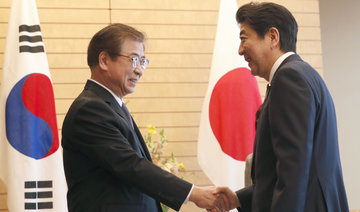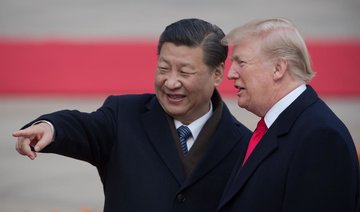TOKYO: Hopes for the release of three American citizens imprisoned in North Korea got a big boost by the news of a possible summit between President Donald Trump and North Korean leader Kim Jong Un.
Freeing the prisoners would be relatively low-hanging fruit and a sign of goodwill by Kim. It would also mark something of a personal success for Trump, who has highlighted the issue since last June, when University of Virginia student Otto Warmbier died days after North Korea turned him over to American authorities.
Trump banned Americans from traveling to the North in response and featured Warmbier’s father prominently in his State of the Union speech in January.
A look at who the current American prisoners are and what a prison sentence in North Korea can entail:
The prisoners
All three Americans now doing time in the North are men, and all three are ethnic Koreans.
Two of them — Tony Kim and Kim Hak Song — were instructors at the Pyongyang University of Science and Technology prior to their arrest and conviction. They are accused of anti-state activities and trying to overthrow the government. The university, which has not been linked to their arrests, is the only privately funded college in the North, founded in 2010 on donations from Christian groups.
Tony Kim, who taught accounting, has been in custody since April last year and is serving a 15-year sentence. Kim Hak Song, an agriculture specialist and evangelical minister who resided with his wife in China, was taken into custody about a month later. He remains in custody, but it’s not clear whether he has been sentenced or what his current status is.
The third and longest-serving prisoner, Kim Dong Chul, is a former Virginia resident who reportedly claims to have been the president of a trade and hotel services company in Rason, a special economic zone on the North Korean border with Russia. He was sentenced in April 2016 to 10 years in prison with hard labor after being convicted of espionage.
How they are tried
Suspects are often arrested when they try to leave North Korea. Warmbier, who was charged with anti-state crimes and the attempted theft of a propaganda banner, and Tony Kim were taken into custody at Pyongyang’s international airport, Kim Hak Song while on a train on his way home to China.
Before being put on trial, detainees are often held in a house-arrest-type situation at their hotel, and some say they were expected to pay the hotel bill for the extra days. They may also be moved to guesthouses or places where they are less likely to be seen by others while the investigation is underway.
Suspects are pushed hard to sign a confession, which many recant after they leave the country, and guilt is generally assumed by the time the case reaches a judge, or a panel of three judges. With little doubt about the outcome, rarely do the proceedings take more than one day — or even a few hours — to complete.
Foreigners charged with serious crimes such as espionage generally have their cases sent directly to the Supreme Court.
Life in prison
Americans aren’t thrown into the same prison system as North Koreans.
Kenneth Bae, a missionary from Washington state who spent two years in prison, said he was kept for the most part in a foreigners-only work camp. It’s possible it was, in fact, meant only for him — he never saw another prisoner there.
In an interview in Pyongyang, the capital, just before his 2016 release, Bae told The Associated Press that he was moved from the work camp to a hospital because of failing health and weight loss. He said he was then sent back to the work camp, which he believed was located not far outside Pyongyang.
He said he did a lot of digging and farm-related labor.
Bae, who was also accused of trying to overthrow the government, said after his release that his cell was small and barren and he was frequently interrogated early on. But he said he was never beaten and was allowed to keep his Bible and pray openly.
How they are freed
The United States and North Korea do not have diplomatic relations. The Swedish Embassy in Pyongyang acts as a go-between when an American is detained.
North Korea claims that releasing American prisoners before they have completed their sentences is a “humanitarian” decision that must be made by Kim Jong Un himself. So, without any US diplomats or legal advocates on the ground, getting a release often requires a trip by a senior US statesman.
Former President Bill Clinton went to North Korea in 2009 to get two journalists, Euna Lee and Laura Ling, who had crossed into the country illegally from China and were given 12-year sentences. Former CIA director James Clapper visited in November 2014 to bring home Bae and tourist Matthew Miller, who was charged with espionage.
Former President Jimmy Carter — who since leaving office has traveled to North Korea three times and even met with Kim Il Sung, Kim Jong Un’s grandfather — brought home Christian missionary Aijalon Gomes in 2010. Gomes had been sentenced to eight years of hard labor for illegal entry and hostile acts against the government.
Joseph Yun, the top US negotiator with North Korea at the time, was the official who went to get Warmbier.




























